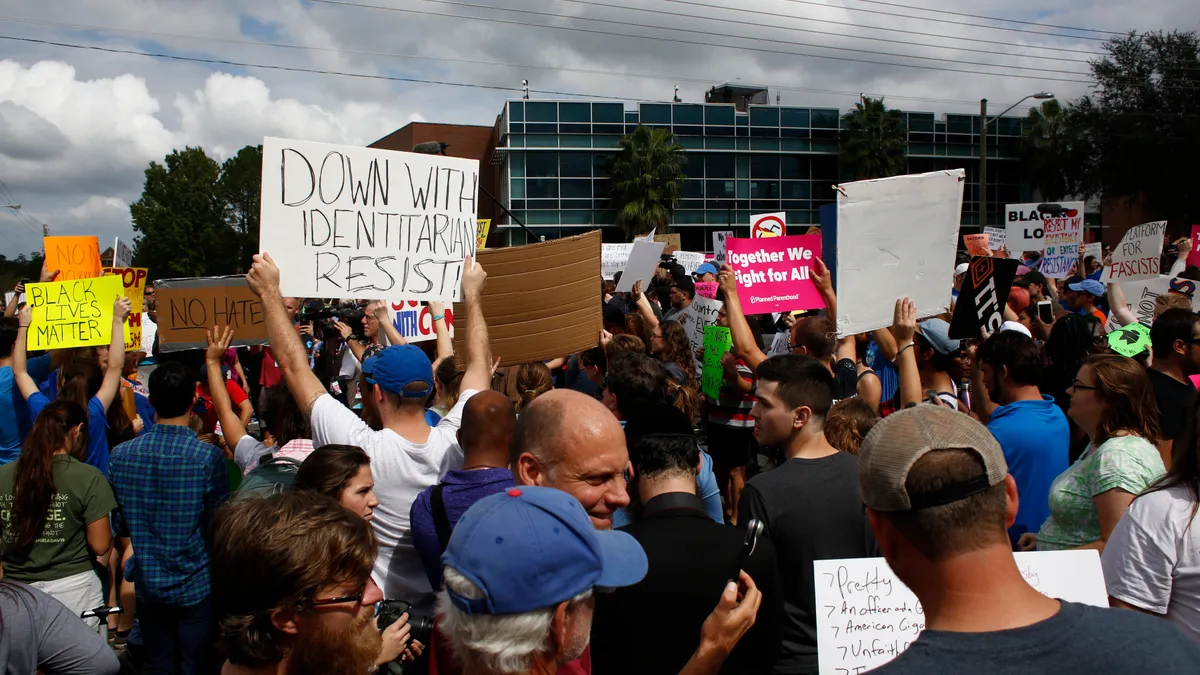Dive Brief:
- Traditional-age college students value free speech and say it is important for democracy, but a shrinking share see free speech rights as secure in the U.S., according to a study released Tuesday revealing a complex picture about attitudes toward freedom of expression on and off campus.
- Almost six in 10 respondents said colleges should allow students to be exposed to all types of speech on campus — even if they find it biased or offensive. But in a theme echoed throughout the report, views diverged by political party, race and ethnicity. While 71% of Republican students and 65% of White students voiced support for exposure to all types of speech, 57% of political independents, 55% of Democrats, 47% of Black students and 45% of Hispanic students said the same.
- Just 47% of students said freedom of speech rights are secure in the country today, according to the study, which was conducted by polling firm Ipsos for the media- and democracy-focused Knight Foundation and follows similar surveys in 2016, 2017 and 2019. The portion who said free speech rights were secure in 2016 was 73%, and it has steadily declined.
Dive Insight:
Partisan divides depressed the percentage of students who said freedom of speech is secure in the country today. Only 27% of Republican students said freedom of speech is secure or very secure, down from 52% in 2019. Among independent students, 46% said the same, down from 59% in 2019. Democrats saw little change in comparison, with 61% saying freedom of speech is secure or very secure in the country today versus 63% in 2019.
But the portion of each group saying freedom of speech is very secure slipped by 10 percentage points or more over the two years.
The survey comes after years of battles over free expression at U.S. colleges.
Republicans, including Education Department leaders during the Trump administration, have denounced what they call cancel culture and attempts to prevent controversial figures from speaking on campuses. Democrats have bemoaned conservative efforts to shape the nature of discourse on and off campus, including Republican politicians attacking critical race theory or pushing legislation to ban "divisive concepts" in diversity training.
Amid the often-noisy debates, the Knight-Ipsos survey is an attempt to map student sentiment. That's important because it can be difficult for college leaders to support free speech on diverse campuses while also building environments that promote student learning, said Evette Alexander, the Knight Foundation's director of learning and impact.
"We're trying to understand where students are coming from in a more nuanced way," Alexander said. "We've been doing this over time, so I think a big value for administrators, professors and folks on the ground is you can see how these shifts are changing over time in key areas."
Findings show students' attitudes toward free speech are shaped by their backgrounds and experiences with speech, Alexander said.
The foundation commissioned Ipsos to conduct a nationally representative survey of more than 1,000 students ages 18 to 24 who were enrolled at different types of colleges.
Nearly two-thirds of students agreed or somewhat agreed that the climate on their campuses prevented some people from saying what they believe because others could find their thoughts offensive. That's up from 54% in 2016.
Only 49% of students said they're comfortable voicing disagreement with their instructors in class. Just 52% were comfortable disagreeing with other students.
At the same time, 17% of students said they've felt unsafe on campus because of something said in reference to race, ethnicity, religion, gender or sexual orientation — regardless of whether the comment was directed at them. That's up from 12% in 2019.
Most students, 83%, said the First Amendment protects people like them. Nine in 10 White students agreed with the statement, compared to 82% of Hispanic students and 51% of Black students.
The portion of Black students who said the First Amendment protects them a great deal fell particularly sharply since 2019, from 25% to 5% in 2021.
Pollsters also asked college students whether institutions should be able to restrict several types of speech. Students generally weren't in favor of prohibiting politically controversial or possibly offensive speech, with the notable exception of racial slurs. Two-thirds of students said colleges should be able to restrict the use of racial slurs on campus.
Support for restricting racial slurs was highest among Democrats at 79%, compared to just 62% among independents and 56% among Republicans. It was 73% among Black students, 70% among Hispanic students and 64% among White students.














